
Spring view

For all paddlers who have an interest in our issue at the Hearts Desire Weir.
There was a public meeting on November 5th. I did not attend but I have paddled the Jock.
Frankly, use of the Hearts Desire site by kayakers and canoeists has not been high on the list of issues that PROJECT MANAGERS are trying to come to grips with at this site. Having said that…
They are well aware that this reach of the Jock River is well-used by whitewater enthusiasts in the post-freshet period of late March to early May, when the weir is not in place. They wonder if the H-beam stubs projecting out of the concrete sill of the structure (see picture below) are perceived by kayakers and canoeists as hazardous. (Any comment?)
So the Weir is taken out and then put back in May 2007 – before the weir is installed
They are also aware that infrequently when summer flows are high enough the structure could be attractive to whitewater enthusiasts. An experienced canoeist drowned at the site in 1986 under high flow conditions similar to those shown below (September 10, 2004 – after the remnants of Hurricane Frances – 135 mm of rain ending an extended period of dry weather); the ensuing Coroner’s Jury recommended the weir be decommissioned unless it is serving a significant purpose - otherwise signage and safety measures should be installed (the former City of Nepean and Hearts Desire community indicated at the time that they wanted the operation of the weir to continue, the RVCA complied with their wishes, improved the warning signs and now anchors an orange and white buoy line upstream in the summer).
RVCA (Rideau Valley conservation authority)
They project managers are attempting to formulate a course of action that will eventually lead the RVCA’s Board of Directors to a policy decision about this structure –continue operating it as it has been operated for the past 32 years, retire and decommission it, or modify it in some way – THey are trying to balance a number of considerations including:
upstream erosion rates and bank instability (with the weir vs. without the weir)
upstream flood risks (with the weir vs. without the weir)
aquatic ecosystem condition (with the weir vs. without the weir)
amenity/aesthetic value of the river to the local communities (with the weir vs. without the weir)
economics – there are no funds at our disposal with which to undertake extensive investigations or modifications of the structure; meanwhile, retiring the structure would reduce operating costs by about $6,000/year and eliminate some occupational health and safety risks
compliance with applicable legislation
From my input, I have emphasized that they should also include this consideration:
[b]recreational (whitewater) potential of the river (with the weir vs. without the weir)
[/b]
I wonder if it’s possible, from a whitewater enthusiast’s point of view, to identify the preferred state of the river at this site - would it be preferable to let it run naturally all year long, or should we continue to install the weir for the May to October period, or would it be desirable to modify the structure in some way?
Any input you could offer to these questions would be very much appreciated.
For more information:
Bruce A. Reid, P.Eng., Director
Watershed Science and Engineering Services
Rideau Valley Conservation Authority
1128 Mill Street
Manotick, Ontario
K4M 1A5
Phone: (613) 692-3571 ext. 1103
Fax: (613) 692-0831
e-mail: bruce.reid@rideauvalley.on.ca
FOLKS,
We only get one good shot at something like this. I need your comments and feedback
President Pete
Whitewater Ontario
OPERATION OF HEARTS DESIRE WEIR (JOCK RIVER)
On the Stewardship page of American Whitewater one may see that every state in the U.S. has a recreational use law that basically says landowners owe no duty of care to whitewater paddlers. Basically it places the responsibility on the paddler for his or her own choices. So landowners have no worries about being sued.
In the Kipawa Judicial Review we asked the Crown whether they would allow use in the future if there was no concern about liability and the lawyer would not let the witness answer. But it certainly would make landowners care a whole lot less about what paddlers do around structures if they didn't have to worry about being sued. On the Bottom Moose river in Old Forge New York Fortis energy do not try to prevent kayakers and canoeists from going over their dam. That is an 18 foot vertical drop into a pool, with a Class IV run out. It is significantly harder than the Kipawa or anything else proposed for the Jock river.
We don't see any similar legislation in Ontario exempting landowners from this duty of care. I think a good place to start is a joint letter from organizations such as Whitewater Ontario, local paddling clubs and an organization like the Rideau Valley Conservation Authority to try and get this issue elevated.
Pete
THis is an important issue for Whitewater Ontario.
The design of a weir, a water control structure must not adversely impact recreational whitewataer paddling.
I attached a paper I wrote on this topic.
I also believe that Cour des Bois and Ottawa River Runners may have their own view of this matter.
Les amis de la riviere Kipawa has just gone to Federal Court over issue exactly of this nature. see www.kipawariver.ca or www.whitewaterontario.blogspot.com
Peter
Peter Karwacki, V.P., Les Amis De La Riviere Kipawa
Address: BOX 39111, Ottawa, Ontario, K1H 7X0
Work: 613-738-1338 x3229 Email: kayaky@hotmail.com
FYI: http://www3.sympatico.ca/kayaky/peter.htm
--------------------------------------------------------------------------------
From: Charles Billington [mailto:charles.billington@rideauvalley.on.ca]
Sent: Thursday, October 25, 2007 11:31 AM
Subject: PUBLIC MEETING- FUTURE OPERATION OF HEARTS DESIRE WEIR (JOCK RIVER)
Good morning- Pasted below is a story that may interest your readers/listeners. Thank you for your consideration.
Charles Billington
Director, Community Relations
Rideau Valley Conservation Authority
(613) 692-3571 ext 1116
1-800-267-3504 ext 1116
charles.billington@rideauvalley.on.ca
Media Release October 25, 2007
Public Meeting to Discuss the Future Operation of
the Hearts Desire Weir
Hearts Desire, October 25, 2007 — The Rideau Valley Conservation Authority (RVCA) is reviewing its current operation procedures for the Hearts Desire Weir on the lower Jock River near Prince of Wales Drive and is looking for public input. A public meeting is being held Monday, November 5, 2007 from 7– 9 p.m. at the Stonebridge Golf and Country Club.
This public meeting will provide local residents with background information about the weir along with technical and community viewpoints regarding the future need of the weir. Speakers from the Conservation Authority, Hearts Desire Community Association, Stonebridge Community Association, City of Ottawa — Parks and Recreation and Friends of the Jock River will make presentations and answer your questions.
The RVCA has operated this seasonal weir since the early 1970’s. Today, the need for continuing its operation is in question. A look at the current conditions (erosion, water quality, fish habitat), pressures and community interests is necessary. A future course of action will be formulated based on feedback received at this meeting.
- end -
For more information, contact:
Diane Downey
RVCA Community Relations Manager
613-692-3571 ext. 1126
diane.downey@rideauvalley.on.ca
[img]


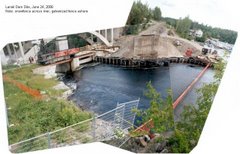


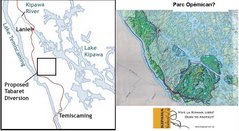

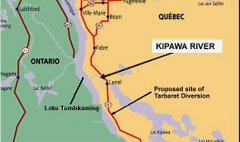

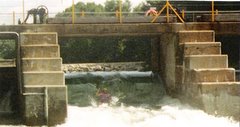







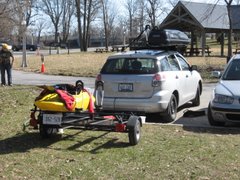

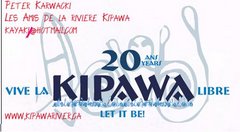
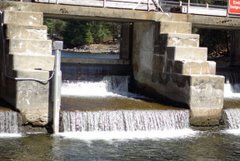


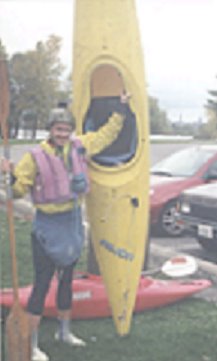



No comments:
Post a Comment